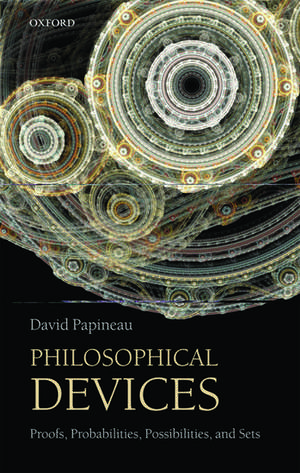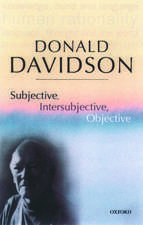Philosophical Devices: Proofs, Probabilities, Possibilities, and Sets
Autor David Papineauen Limba Engleză Paperback – 4 oct 2012
| Toate formatele și edițiile | Preț | Express |
|---|---|---|
| Paperback (1) | 129.08 lei 10-16 zile | +29.99 lei 5-11 zile |
| OUP OXFORD – 4 oct 2012 | 129.08 lei 10-16 zile | +29.99 lei 5-11 zile |
| Hardback (1) | 380.34 lei 31-37 zile | |
| OUP OXFORD – 4 oct 2012 | 380.34 lei 31-37 zile |
Preț: 129.08 lei
Preț vechi: 149.50 lei
-14% Nou
Puncte Express: 194
Preț estimativ în valută:
24.70€ • 25.69$ • 20.39£
24.70€ • 25.69$ • 20.39£
Carte disponibilă
Livrare economică 13-19 martie
Livrare express 08-14 martie pentru 39.98 lei
Preluare comenzi: 021 569.72.76
Specificații
ISBN-13: 9780199651733
ISBN-10: 0199651736
Pagini: 224
Ilustrații: line-drawings
Dimensiuni: 135 x 203 x 12 mm
Greutate: 0.25 kg
Editura: OUP OXFORD
Colecția OUP Oxford
Locul publicării:Oxford, United Kingdom
ISBN-10: 0199651736
Pagini: 224
Ilustrații: line-drawings
Dimensiuni: 135 x 203 x 12 mm
Greutate: 0.25 kg
Editura: OUP OXFORD
Colecția OUP Oxford
Locul publicării:Oxford, United Kingdom
Recenzii
an engaging, genuinely expository text. It is hard to imagine a better execution of the project of introducing the basics of technical philosophy non-technically. ... an invaluable addition to undergraduate reading lists, and I certainly will make use of it in my teaching.
The book is a clear and straightforward introduction to technical methods and concepts that have widespread applications in analytic philosophy and other sciences. For this reason it is an excellent introductory text.
Papineau has written a suprising book. Though small in size it can serve as a template for a variety of undergraduate philosophy courses as instructors choose to emphasize various parts of the presentation. The text is clearly and accurately written. The pedagogy sets out concepts in a sequential order that works well. This is a highly recommended text.
This is a very good book for students learning about philosophical methods. The sections are concise, easily accessible and well well-written. I've been looking for a book like this on philosophical methods for a while now and this is one of the few that I've found so it is covering a needed gap in the market. I will definitely be recommending it to my library for purchase and to students.
The book is a clear and straightforward introduction to technical methods and concepts that have widespread applications in analytic philosophy and other sciences. For this reason it is an excellent introductory text.
Papineau has written a suprising book. Though small in size it can serve as a template for a variety of undergraduate philosophy courses as instructors choose to emphasize various parts of the presentation. The text is clearly and accurately written. The pedagogy sets out concepts in a sequential order that works well. This is a highly recommended text.
This is a very good book for students learning about philosophical methods. The sections are concise, easily accessible and well well-written. I've been looking for a book like this on philosophical methods for a while now and this is one of the few that I've found so it is covering a needed gap in the market. I will definitely be recommending it to my library for purchase and to students.
Notă biografică
David Papineau was educated in Trinidad, England, and South Africa. He has a BSc in mathematics from the University of KwaZulu-Natal and a BA and PhD in philosophy from Cambridge. He has lectured at Reading University, Macquarie University, Birkbeck College London, and Cambridge University. Since 1990 he has been Professor of Philosophy at King's College London.He was President of the British Society for the Philosophy of Science from 1993 to 1995. In 1999-2000 he was a Leverhulme Research Fellow and in 2007 a Mind Fellow. He was President of the Mind Association for 2009-10. In 2010 he gave the Rudolf Carnap Lectures in Bochum, Germany and in 2011 the Gottlob Frege Lectures in Tartu, Estonia.



















